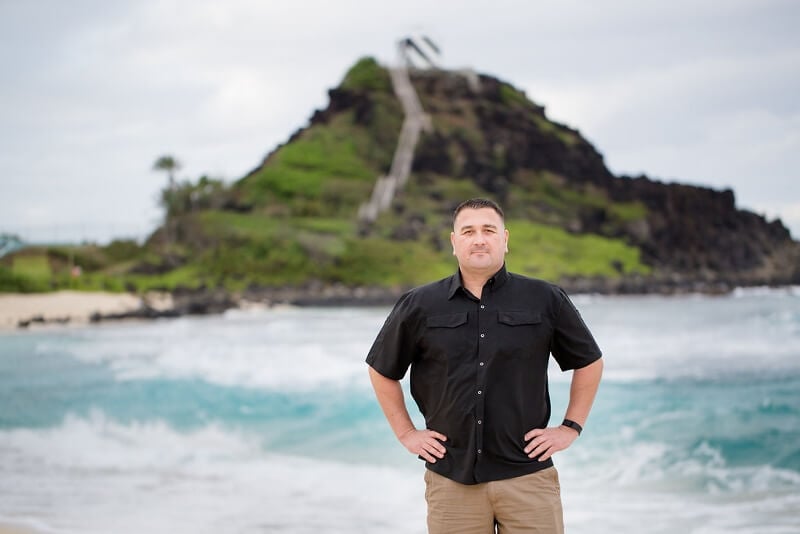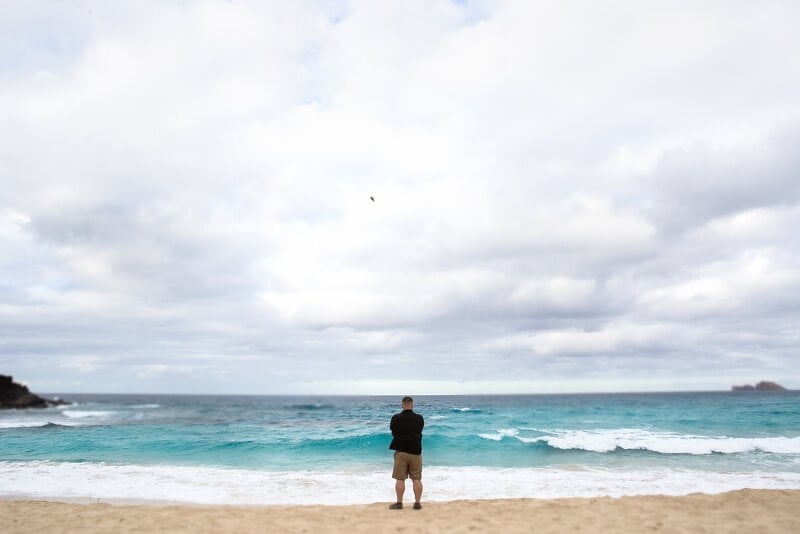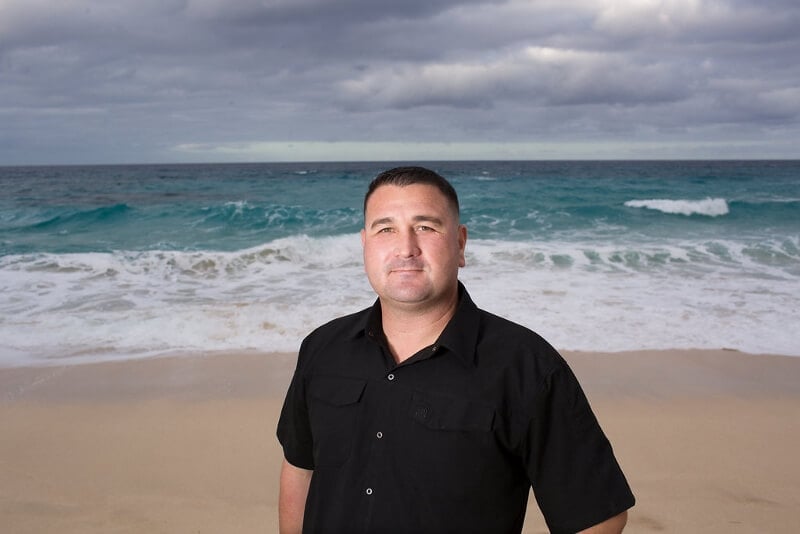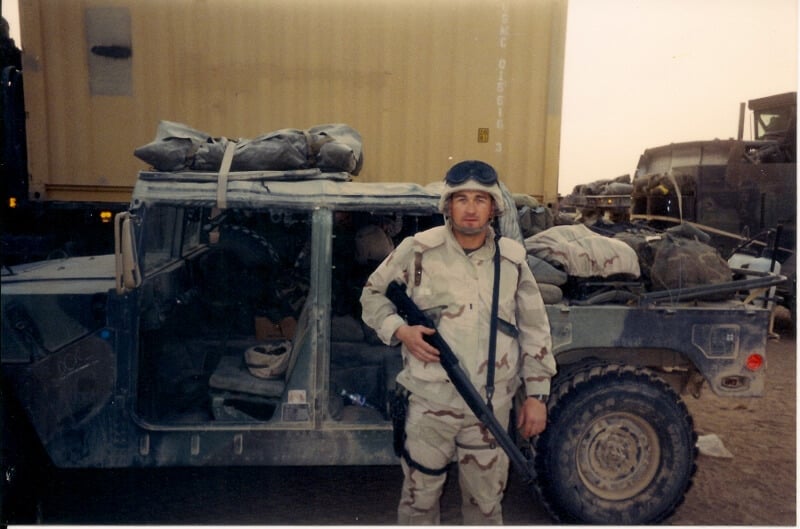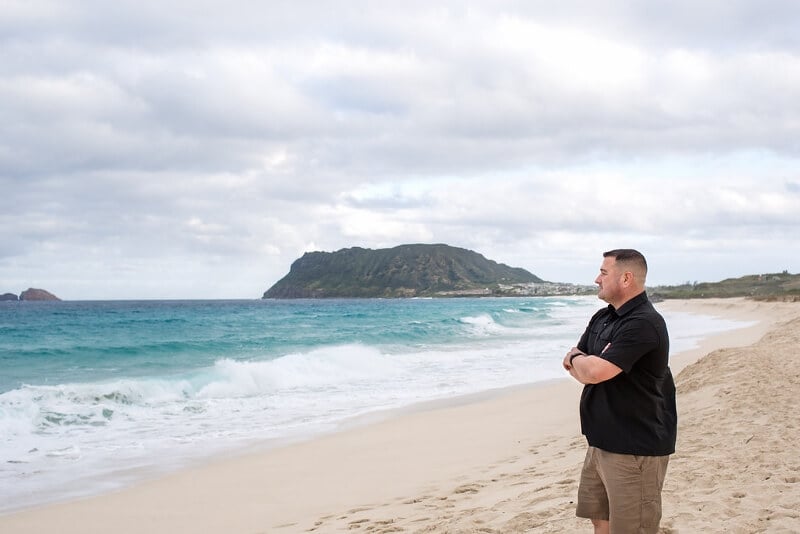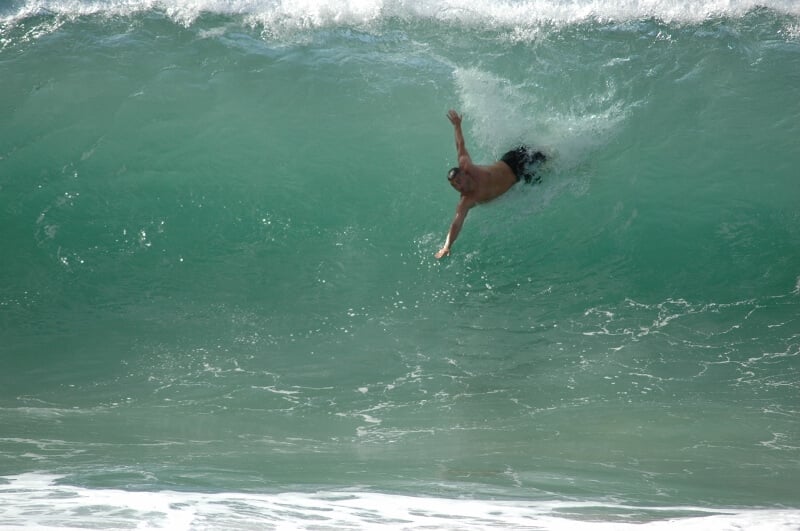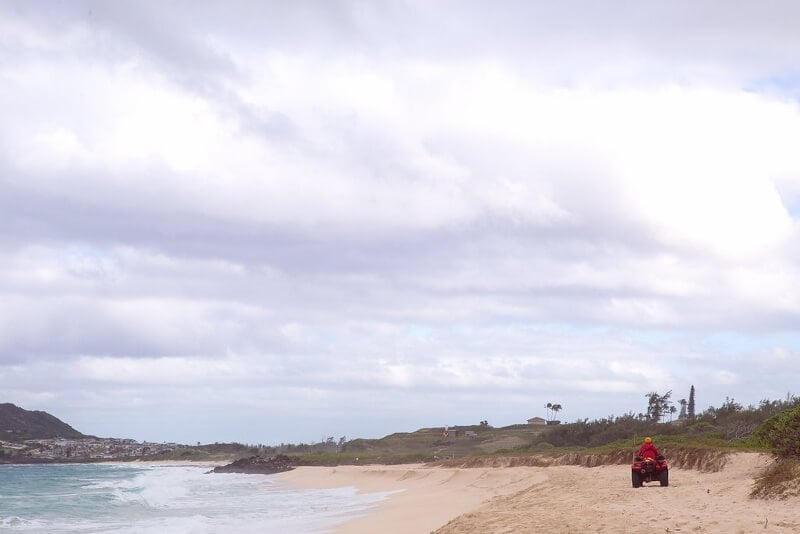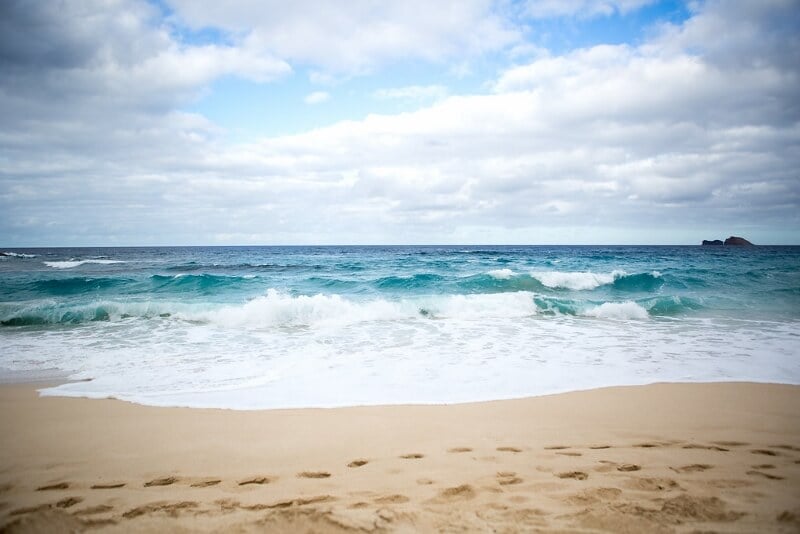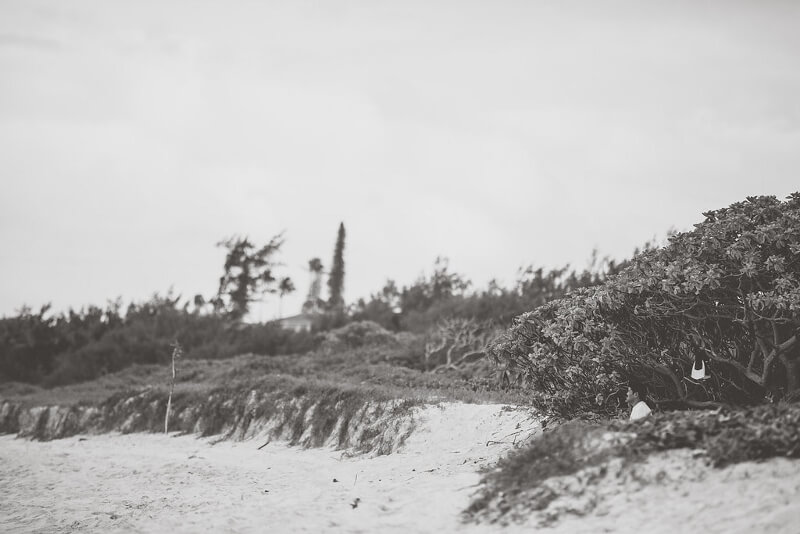Armed with a camera, retired Marine Corps Captain Ben Mercier has a passion for telling stories, and he does so in a multitude of ways. He has written and produced his first Hawaiian surf history documentary, The Black Shorts. He films and creates captivating surf genre videos that have garnered nearly one million YouTube hits, and he works up-to-the-minute as a multimedia journalist for Hawaii News Now.
After ten years in the Marine Corps with two combat tours in Iraq, Ben has found his own remedy for living with Post Traumatic Stress Disorder; he finds new missions to embark on as he researches and documents Hawaii’s past, and captures daily life and events from around the islands with his new weapon, a camera.
While sitting down with Ben one late afternoon at Pyramid Rock Beach, I discovered how much his personal struggle directly influences his desire to tell human stories. Ben has found a positive outlet and a sense of solace in a post-military life spent recording tangible experiences. He is also a giver, he says. He has always liked helping people. That giving nature and his experience in combat combine and motivate him to help his fellow Wounded Warriors through the annual Pyramid Rock Bodysurfing Championship at Marine Corps Base Hawaii, now in its ninth year.
Ben’s story begins as a kid in California. An exceptional swimmer whose talent took him to the University of Hawaii and the Olympic Trials. He also had a goal of being in the military and serving his country. In 1999, he became an officer in the United States Marine Corps. One day during a Marine Corps swim course, a phone call would set him on a path that would define the next decade of his life. We are proud to have Ben Mercier – a Marine veteran, a Wounded Warrior, a filmmaker, and a water sport lover who gives back and never gives up – as our Hawaii VA Loans February 2015 Ambassador. Read our interview below.
Q&A with Ben Mercier
Where did you grow up?
I was born on a Naval Air Station Lemoore in California. My dad was an air traffic controller in the Navy. We lived there for four years and moved to the city of Lemoore after that. I lived there until I was about twelve and then we moved to Fresno.
What kind of water sports were you into then?
I was a competitive swimmer since I was four years old.
That’s right, you went to the University of Hawaii to swim?
I got a full scholarship to UH and competed in the 1996 Olympic Trials. I went to about twelve or more U.S. Nationals and placed fifth one year. I made the finals many times at Nationals.
What was your specialty?
The 200 meter butterfly. I got pneumonia though during Hell Week training over Christmas. We’d do ten miles of swimming a day plus dry land, and we were going to Sandy Beach in between to bodysurf. I got sick and it just tore me apart right before Olympic Trials. My endurance was shot. I still went, but I felt like a piano was on my back. I could barely move my arms the last couple strokes. I was upset, because I had a good shot of making it. I was ranked 5th in the U.S. that year.
What was your military influence as a young kid?
My best friend’s dad was a fighter pilot in the Navy and I wanted to be a pilot. Later on in high school, I wanted to be a Navy SEAL or a pilot. When I got back from UH, I went in to talk to the recruiters and they said that the officer waiting list for the SEAL training was two years, so I went in the Marine Corps.
Why did you want to join the Marines in particular?
I wanted to join the Marines because it was the toughest – and for the image of being a Marine. I wanted to be the best of the best. I like challenges and I’m always challenging myself.
Tell me about your time in the Marines.
Well, I did get a flight school slot, so I went to Pensacola and tried my heart out, but didn’t make it. I was more of the liberal studies side in my major, so I never took Calculus, and we only had a week to learn it. I’m thinking, “I don’t understand this.” I couldn’t pass it. So they gave me one of my top choices because I didn’t quit. In fact, I almost broke the record there for swimming a mile in a flight suit. I think I was about ten seconds off.
In a flight suit with boots on?!
I can’t remember if we had boots. It was hard, because all the water gets stuck in the suit.
What did they give you after Pensacola?
They gave me Logistics and I knew that I’d be good at that because I’m good at coordinating and stuff like that. I went to Logistics school and got stationed at Cherry Point, North Carolina with Marine Wing Support Squadron 271. Three months after I got there, I was in Combat Water Survival School Swim Instructor Course, and I got a call on the phone at the pool – they said you’re deploying in eight days to take over the Marine ships from Sicily to Kuwait to do the offloading to get ready for the war. We were one of the first ones over there before anyone was there.
What was that experience like on the ship traveling to Kuwait?
We had about thirty Marines and seventy Navy personnel. It was about a two week voyage from Sicily to Kuwait, and there were pirates out there. I didn’t believe it until we stood watch with the Captain and saw speed boats coming up behind us. It was the real deal. We had Navy ships from different countries helping us. We made up our own security – myself, a Master Gunnery Sergeant, and a Warrant Officer. We came up with plans and a quick reaction force – five or six times we had to call it out.
Tell me about your responsibilities when the Iraq War started.
The night before the war started, we went to get our ammo and the Captain who was in charge of me goes, “Oh, you’re going to take my place. You’re going to be the head logistics officer for the unit of 500 people. Myself, the supply officer, and the embarkation officer are going to stay in Kuwait and try to push supplies forward.” It was the stupidest thing I’d ever heard, and I wasn’t in on all the planning, so I was going in blind. I was in charge of all the Marines and it was crazy.
That night, two scuds were coming in overhead – we were at Camp Workhorse in the middle of the desert in Kuwait – and I could hear it in the air. Then I heard behind us, two patriot missiles went up, and once they hit, it looked like the sun had exploded. Five seconds later, the shockwave came down. I was just about to lay down in my cot next to the truck and we all started running. There was only one little bunker to hide in, and everyone’s trying to get in there, and it was full and people were still trying to get in. It was kind of funny. That was a crazy night.
We went in early that morning. They gave me bird shot in my shotgun for some reason…
Birdshot???
You know, the little bitty BB’s that just bounce off of you? I don’t know how that got there, but I had birdshot in my shotgun during the invasion of Iraq. I had my pistol though. We did a two week convoy during the invasion behind Regimental Combat Team 5 to support them. We refueled and rearmed the aircraft. We set up refueling points on the highway or the side of the highway during the invasion and we’d move forward when the infantry did. Our unit helped the aircraft keep supplying close air support to the troops. A good documentary to watch about what it was really like is Severe Clear. We were right behind those guys.
How did you feel when you came back from that first deployment?
I didn’t feel the same. I didn’t want to be around certain people in the unit and I started drinking more alcohol. I had PTSD, but I didn’t know it. I wanted to get back to Hawaii. My unit was about to go back to Iraq and I went to a special school called MOTS-1 in Yuma, Arizona. It’s like a top school for specialties in the Marine Corps, so I was trained to set up airfields. Luckily, I got hot fill orders back here because they needed a Logistics Officer right away.
When did you deploy for a second time?
A year after I became the Assistant Logistics Officer with the 3rd Marines here, I got deployed to Baghdad. I was in charge of supporting the Iraqi forces we were building up with all their barracks and logistics stuff. The first week I was there, two suburban-sized vehicles came in and blew up the gate with IEDs, and that blew me against the wall and gave me my third traumatic brain injury.
We were located in the Green Zone, but we were right by the Red Zone and the Ministry of Defense, so they would mortar us and shoot rockets at us on a daily basis. Saddam Hussein was two blocks away underground and we’d see his convoys go by. One day, I got in a vehicle with a Colonel and there was an IED in the tailpipe of the vehicle next to us. People we’d work with like interpreters would get assassinated. People would disappear. A suicide bomber killed a bunch of the Iraqis who were working with us – janitorial guys and guys who gave us haircuts. It was the second time in Iraq – that’s what really messed me up.
Explain what coming back home was like after that second deployment.
Well, among other physical injuries, I tore my meniscus right before I left. When I got back here, they put me on OxyContin and it took them ten months to get me a surgery. I was on 10mg a day and it covered up all the PTSD. It covered up the pain pretty good and I didn’t think about Iraq. I never told my parents anything about my experience or what it was like. After I had the surgery, I got off the medicine in about two weeks. Then I started having nightmares and anxiety attacks. I could barely drive – loud noises, kids crying, just driving to work was hard, shopping for food at the store – too much going on, too many colors. That lasted from 2007 to this year.
Is it a feeling of being on high alert?
Yeah, it’s “on guard.” I was also angry and drinking a lot. I finally saw a Navy doctor who took care of me and finally got me to Wounded Warriors.
Did you transition out of the Marines shortly after that?
I was in Wounded Warriors for about a year and I went to Tripler and did a two month in-patient program with eleven other service members. It taught me a lot about it, but it didn’t help me. Once I retired, I went to the VA and was going to all these psychologists twice a week. It was still bringing up all these thoughts. It was never ending. I would get anxious before I’d go there just thinking about it. Finally, I stopped going and got off all my medications. I know what I have, I just need to deal with it myself.
What are some of your outlets that help you with anxiety?
I never had exposure therapy, I never made it to that level to get out and force yourself to go through those situations. I’ve been working for the news almost ten months now and that has had a major positive effect on my PTSD. That’s the thing that’s helped me the most. Now I have a mission. I have to go get this coverage for the news. I have my camera. It’s like my new weapon. Every day is different and I like that. It’s high stress for the amount stuff we’ve got to do in a day.
Tell me about the origins of the Pyramid Rock Bodysurfing Championship.
My first time to Pyramid Rock out here, I was bodysurfing, and I saw some other bodysurfers in the water. I was like this beach is awesome. Some guys saw me and they were members of the Hawaii State Bodysurfing Association – these were two of the founding members, Steve Capella and Al Balderama. They put their card on my Jeep when they left that day. Two years later, we coordinated with the base and started the first Pyramid Rock Bodysurfing Championship. The HSBA really helps out with the contest every year. They provide the judging and additional support we need.
It’s in its ninth year. What impact have you seen the contest have with the military community and the public?
The public has been really happy. They’re happy to get base access to be here and it’s for a good cause. All the money we raise goes to the Wounded Warriors and their families. Our first year, we had the most people, and now we average around 100-110. This year, maybe it will be bigger. It really depends on the conditions.
I watched quite a few of your surf genre videos online and it’s hard to tear your eyes away from that kind of action and videography. I particularly liked the bodysurfing one you edited where you had the bodysurfer going in reverse.
I did that one when I was in the hospital. On my time off, I would edit stuff. I started it as an outlet, as a hobby to get my mind off of it, and people liked my stuff. I almost have a million hits on YouTube now. In the beginning, I really didn’t know what I was doing until I went to school and got my MFA in Digital Cinema.
You’re working on your first film called The Black Shorts. Tell me about that project and where’s it’s at.
People have the wrong idea about the Hui O He’e Nalu. There’s a purpose to why they did things in the past. I tell the history of where the first world circuit of surfing started. People think it’s the ASP, but it was the IPS (International Professional Surfers) back then. It transformed the North Shore. It was on the three major networks, and the first time in 1976, all of America could see Hawaii’s North Shore. That’s when all the tourists started coming in to the North Shore. The Hawaiians felt threatened – their land, their culture – and they weren’t being included. They said enough is enough, so they formed the club to let people know “you’re not going to come in here and disrespect us.” It’s interesting. The storyline is all put together and I’d like to get one more interview.
What advice do you have for service members who’ve experienced combat deployments and are getting out of the military?
Well, when I was going through, it was kind of tough because they were just setting up the Wounded Warriors and a lot of people slipped through the cracks and weren’t getting the support they needed. I helped myself the most. For guys getting out who have the same problems, get family support, friend support, and use the VA for sure.
Since you are a creative individual, what kind of things inspire you today?
I’m a giver. I like helping and that makes me happy to help people and teach people things. I like doing the more human interest stories. I love photography and making films. I love cinematography, that’s my favorite.
Did you think when you were younger that filmmaking was a field you might one day pursue?
No, but my mom, Cheryl Mercier, is more artistic. She was a science teacher, author, and illustrator for Addison-Wesley books. She has five teaching books out for teaching methods for science teachers.
Have you found that you’ve veered more toward that creative side of your family then?
Yeah. Logistics was more creative, and I like the structure of the military, and the leadership of it. I miss it. Combat camera would be cool. I learned the filmmaking side of making narrative films and specialized documentary, and now I’m learning the television side of telling stories. I also manage another studio called Yellowbird Live where we do live shots for CNN, CNBC, The Golf Channel – all the major networks. We’re trying to get it going more. We do it over the internet, and we have high, high speed internet. We can send live to any network, so you don’t have to use a satellite truck, because it’s in the studio.
What is it about Hawaii that called you back here and makes you stay?
I love the beach and I love the ocean. I always want to get back here. I love all water sports – bodysurfing, fishing, spear fishing, diving. It calms me down, that’s why I like it.
What’s one thing newcomers to the island should know?
Take in your surroundings, learn and respect the culture, and find some Hawaiian friends.
Mahalo nui loa to Ben Mercier for sitting down on that uncomfortable beach log for this interview! Here at Hawaii VA Loans, we feel it’s important to share the real and inspiring experiences of our veterans and service members who have sacrificed so much for us. We are fortunate to have veterans like Ben who not only continue to serve outside of the military, but who enjoy and cherish the state of Hawaii. Make sure to check out the action at Pyramid Rock Beach on Sunday, February 8, 2015 at 8:00am for the 9th Annual Pyramid Rock Bodysurfing Championship! For more info on Ben, check out his LinkedIn.
Photography by Keao

